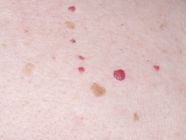What is a hemangioma?
A hemangioma is a benign (non-malignant) tumor consisting of an abnormal group of blood vessels. They can appear anywhere on the body, but are most commonly found on the head, neck, scalp, face, or eyelid. Hemangiomas can also appear in internal organs, such as the liver, lungs, or brain. (1) (2)
You may not notice the hemangioma immediately after birth, as it begins to appear clearly during the first few months after birth, reaches its peak growth during the first six months, and then usually disappears on its own when the child reaches the age of one or two years without the need for treatment, but sometimes it lasts for a longer period. (1) (2)
Why does a hemangioma appear?
We do not yet know the exact cause of hemangiomas, but there are some theories that doctors are investigating, including that certain proteins in the placenta during pregnancy may play a role in the formation of hemangiomas.
There are some factors that may increase the chance of these hemangiomas appearing, such as: (3) (4)
- Premature birth.
- Giving birth to a baby weighing less than normal.
- Sex; Girls are more vulnerable than boys.
- Mother's age; the older the mother, the greater the chance of hemangioma appearing.
- Pregnancy with twins or more.
What does a hemangioma look like?
The baby may not show any sign of the hemangioma at birth, or it may appear as a flat blue or red spot at first. The hemangioma enlarges over the first months of the infant's life, and later during the first year of life the hemangioma begins to shrink until little or no trace of it remains. The shrinkage process can continue until the child reaches or exceeds the age of seven. (4)
Diagnosis of hemangioma
Most types of hemangioma do not require specific tests, especially superficial hemangiomas, as the doctor relies on a visual examination of the skin, and sometimes he may request a biopsy of the hemangioma tissue to rule out any other diseases and health problems. If the hemangioma is deep, the doctor may order an imaging examination of it. (3)
Treatment of hemangioma
Most hemangiomas do not require any treatment. It often disappears on its own, and the doctor only observes the hemangioma to examine it and evaluate its shape and size. (4)
In some cases, the doctor may prefer to treat a hemangioma if it is large, covers a large area of the body, affects the appearance of the affected person, if it causes open sores, is exposed to infection and inflammation, or if its location affects vision. (4)(5)
Among the treatments available:
Medications
The most prominent medications used are: (2)
- Propranolol It is the first treatment for hemangiomas, as it works to stop the growth of the hemangioma and reduce its thickness and size. It is available in the form of an oral syrup or an ointment that is applied directly to the skin.
- Corticosteroids: It is known among people as cortisone medications. It is used if propranolol is not enough to reduce hemangioma or when there are contraindications to its use. The doctor prescribes it in the form of injections directly into the hemangioma, ointment, syrup or oral tablets.
Laser treatment
It can help stop the growth of the hemangioma and reduce its size or lighten its color. It is only used for superficial hemangioma. (2)
Surgical treatment
Surgical treatment is becoming less common. Some children need surgery if the hemangioma does not improve with medication or laser treatment, or it obstructs the child's vision, but most hemangiomas around the eye do not require surgery. (2)
Frequently Asked Questions
Is a hemangioma related to cravings?
There is a widespread belief among people that a hemangioma is related to the mother’s craving for something during pregnancy, such as grapes or pomegranates, but this is not true. As we mentioned, there is no clear reason for the occurrence of a hemangioma.
Worried about your child’s hemangioma? Visit the Pediatrics Department at Al-Ahli Hospital, where our experienced and compassionate team provides expert diagnosis and tailored care for your little one’s needs.
References
- Hemangioma - OrthoInfo - AAOS
- What Is Hemangioma? - American Academy of Ophthalmology
- Hemangioma - StatPearls - NCBI Bookshelf
- Infantile Hemangiomas (for Parents) - Nemours KidsHealth
- Hemangioma: Types, Diagnosis and Treatment Options
- What Is Hemangioma? - American Academy of Ophthalmology






